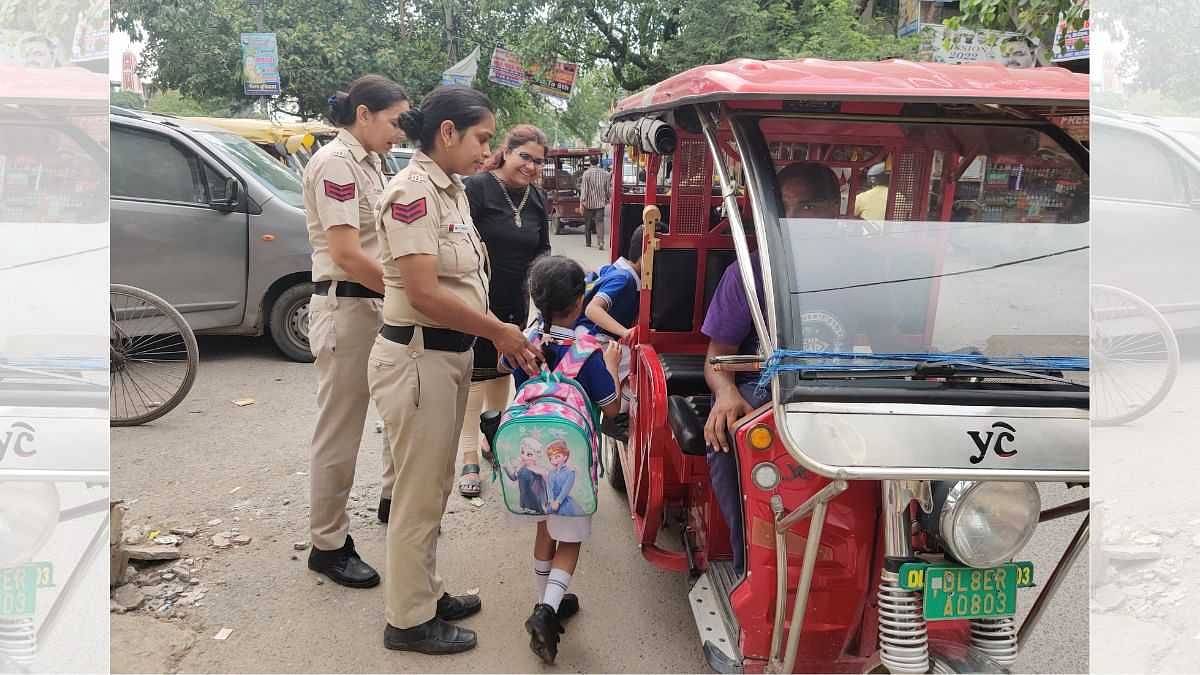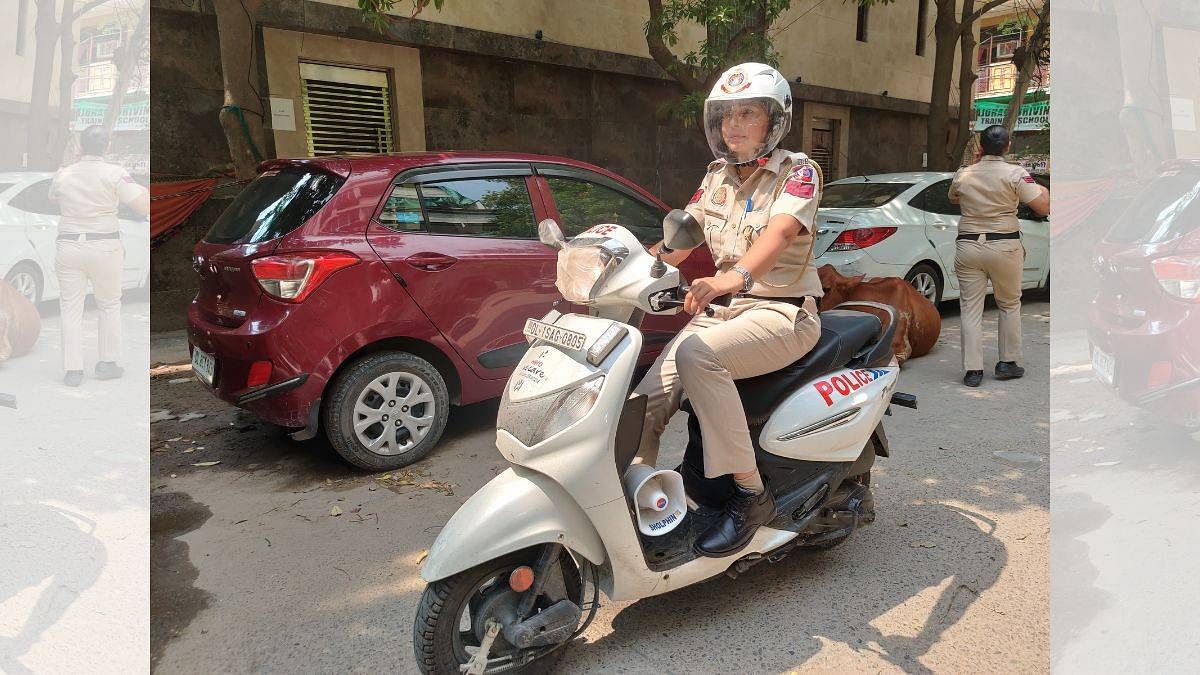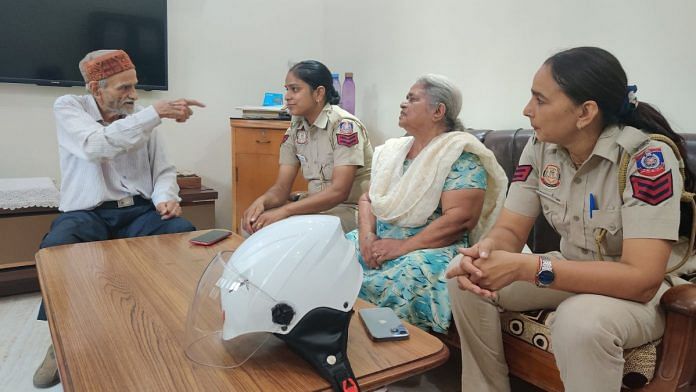New Delhi: For Delhi Police Head Constable Vandana Dubey, being a ‘tejaswini’ is an “adrenaline rush”. For Head Constable Anuradha Chaudhary, the thrill lies in breaking gender stereotypes and defeating misogyny.
For both Dubey and Chaudhary, and dozens of women personnel in northwest Delhi, ‘tejaswini‘ is a source of empowerment they have long coveted.
Led by Deputy Commissioner of Police (Northwest Delhi) Usha Rangnani, the Tejaswini: Women Centric Safety & Empowerment Initiative was kicked off last year on 10 July with 52 female beat personnel deployed across the district.
According to Delhi Police, the dedicated all-women beat system has led to an overall decline of 37 per cent in street crime in the district within a year.
From apprehending thieves, robbers and snatchers and setting sexual harassers straight, to cracking down on illicit liquor and illegal arms trade, the tejaswinis do it all. The beat police personnel function in their assigned areas of around 3 kilometres in “sensitive beats”, which include the JJ (jhuggi jhopdi) clusters of Jahangirpuri, Shakurpur and Pitampura residential areas, the Bhalswa Village, market and mall complexes, Metro stations, schools and colleges.
“Field duty is not just a man’s job,” said Chaudhary, adding that she got inspired to join the force after seeing various actresses playing the role of female police officers in action movies.
“How are we any different from them? We can run, we can fight, we can probe and then we can go back home and fulfil our other responsibilities as well.”
Sitting at the complaint desk of Adarsh Nagar Police station, Dubey talked about how she would patiently wait for the day she could wear the khaki uniform and roam the city, fighting criminals.
Speaking to ThePrint, Rangnani said the tejaswini initiative “was started to empower female police personnel with the major focus on women’s safety and empowerment”.
“Earlier, too, female beat cops were there, but their role was mostly restricted to paperwork and not so much field work.”
“In this system, the tejaswinis aren’t a dummy of their male counterparts. They go on to the field, fight crime and also investigate cases,” she added.
ThePrint spent a day with two tejaswinis — Dubey and Chaudhary — posted at the Adarsh Nagar Police Station, to understand how they function, the obstacles they face and how they challenge patriarchy at home, in the workplace and on the streets.
A typical day for Dubey and Chaudhary — who have been in the police force for 13 and 16 years, respectively — begins at 6 am. After rounding up the household chores, they hop on to their two-wheelers to reach the thana by 9 am sharp.
At the police station, they spend the first hour going through the list of complaints filed, after which the complainants are given the exact time for later in the day to come meet the personnel. As the clock strikes 10, the tejaswinis are off again for morning patrolling duty on their respective beats.
Around 12.30 pm, they head over to the schools in their area to help young children cross roads and board public transportation to get home. Soon after, they visit senior citizens in the area, checking on their health, asking if they are facing any trouble and, sometimes, even arranging for basic amenities, like groceries and medicines, if needed.

From 2 to 5 pm, they meet complainants, ducking away for a quick lunch when they can, before heading out for evening patrolling duty.
On some days they return home well past midnight, by which time their children have completed their homework, attended their tuition classes and are already in bed. On the days they make it home by 9 pm, they are able to spend half an hour with their children.
It hasn’t been easy. “When Usha ma’am announced the new system, we were thrilled. Not everyone was happy, though. Some of our family members made faces, some of the male policemen taunted us saying, ‘Dus din ki baat hai bas, wapas jayenge desk pe [this will be a matter of 10 days. They’ll be back to desk work after that]’,” said Chaudhary.
But there has been no looking back, added Dubey. “With time, people started respecting us and working with us,” she said. “Now, everyone in our beat looks up to us.”
Also read: Only 10.5% of cops in India are women & 1 in 3 police stations has CCTV, finds report
Breaking barriers
Before setting off on her two-wheeler — a scooty — Dubey wiped the seat. Riding down the road, she said, “This has a very high speed. Those of us who can ride bikes are given those as well.”
Two weeks ago, Mamata, a 38-year-old resident of Delhi saw a tejaswini in action.
Mamata had been standing at a bus stop, when, she told ThePrint, “a few boys began teasing me”.
Dubey, who was passing by the bus stop, saw what was happening and stopped. She initially tried to get the boys to apologise and leave the spot, she said, but when they didn’t listen, she had to resort to calling additional force and arresting them. “They have never been seen again in the area,” said Dubey.

Mamata said she feels more comfortable coming to the station with female beat personnel on duty. “There are some things we don’t feel comfortable saying in front of male officers,” she said.
Hemraj Wadhwa, a nonagenarian, who lives in Delhi with his wife Mohini and two of his daughter’s children, alleges that his landline service provider’s “mischievous staff” routinely disconnect his telephone connection. He then files a complaint with the tejaswinis, who “get it restored in no time”.
However, despite the authority their uniform affords them, tejaswinis say they have to fight misogyny on the streets often.
“Once I stopped a minor girl riding a scooty. Her father was on another scooty. I told him she was too young to be riding a vehicle, that she wasn’t wearing a helmet and that both actions were illegal. He told me to mind my own business,” said Chaudhary.
“His behaviour was hostile only because he was speaking to a female beat cop. The moment the [male] assistant sub-inspector came, his tone changed.”
Apart from fighting crime, tejaswinis also visit schools to educate students on ‘good touch and bad touch’ and train female students in self-defence techniques.
“Women can function independently, handle criminals and bring down the crime rate,” said DCP Rangnani. “They have broken the shackles of patriarchy and societal norms that somewhat restrict the role of women to behind a desk.”
With their jobs, say Dubey and Chaudhary, there has been some progress at home too. Although the majority of tasks are still done by them, their partners pitch in.
“One has to understand the hurdles faced by female beat personnel — coming out to perform duties on streets, instead of doing a fixed 10 to 5 job, was not easy for them with the kind of resources available to them at their level,” Rangnani added.
“When duty calls, they leave their families behind, where they play a myriad other roles — a mother, wife, daughter-in-law. Some might not have a good support system at home,” she said. “But, despite these hiccups, they shine in their roles and have proven over and over again that field duty is not just a man’s job.”
(Edited by Zinnia Ray Chaudhuri)
Also read: Indian women in police shouldn’t be restricted to ‘pink squads’. Put uniforms to better use



